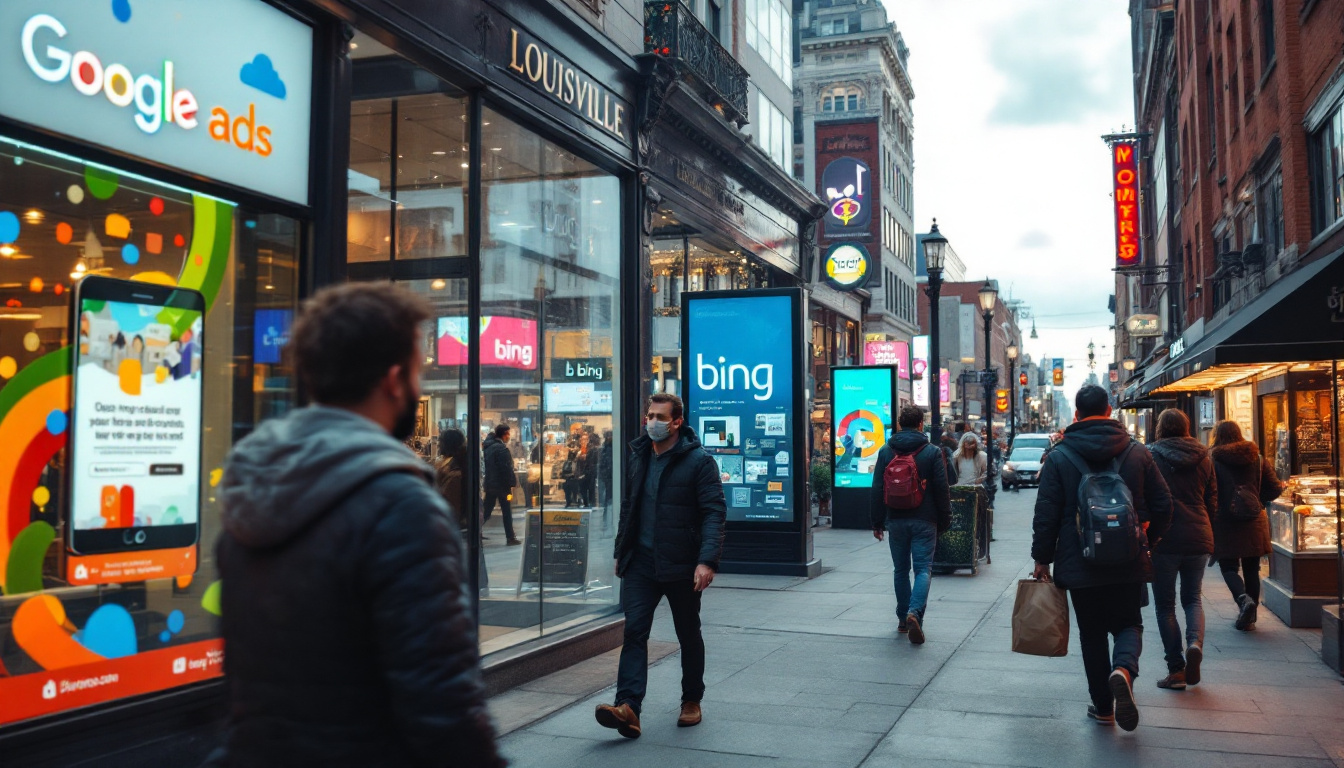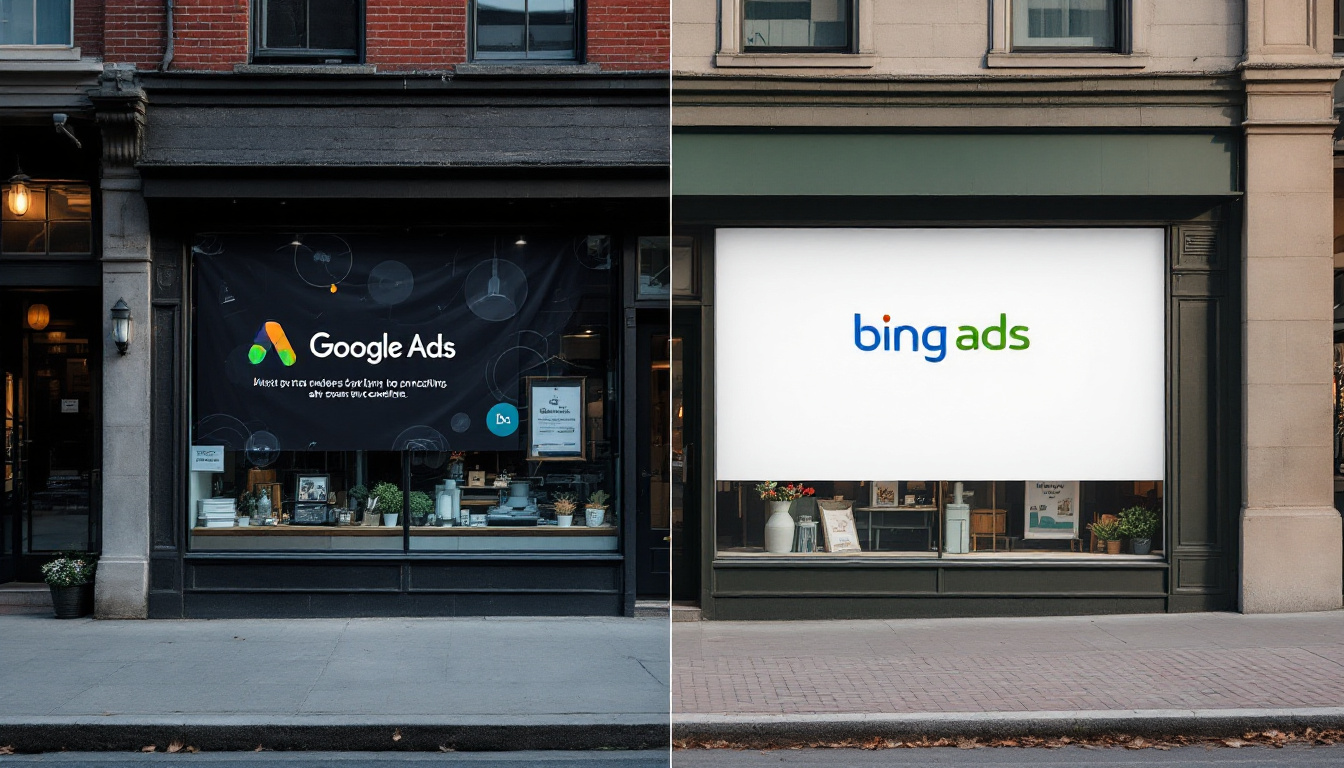Google Ads vs. Bing Ads for Louisville, KY Businesses: Which is Better?

In the digital marketing landscape, businesses strive to maximize their return on investment through effective online advertising. Among the most popular platforms for pay-per-click (PPC) advertising are Google Ads and Bing Ads. This article will explore the advantages and disadvantages of both platforms, particularly for businesses located in Louisville, KY. By understanding which platform may be better suited for their needs, businesses can make informed decisions that drive growth and improve visibility.
Key differences between Google Ads and Bing Ads
The primary difference between Google Ads and Bing Ads is their respective reach. Google Ads is connected to the world’s largest search engine, capturing over 90% of the global search engine market share. In contrast, Bing Ads, while less prominent, still offers significant exposure, particularly in certain demographics. This difference in reach can have a profound impact on the effectiveness of advertising campaigns, as businesses must consider where their target audience is most likely to engage with their ads.

Another important distinction lies in the user interface and campaign management tools. Google Ads tends to be more robust, offering a wider variety of ad formats, targeting options, and analytical tools that allow for more precise tracking of campaign performance. Bing Ads, however, is often seen as the more user-friendly option for newcomers, with a simpler setup process that can appeal to small businesses with limited resources. This ease of use can be particularly beneficial for those who may not have extensive experience in digital marketing, allowing them to launch campaigns quickly and efficiently.
Additionally, the pricing structure can differ widely between the two platforms. Generally, businesses find that Bing Ads tends to offer lower cost-per-click (CPC) rates compared to Google Ads, which can lead to a higher return on investment in some cases. However, the lower traffic volume on Bing can impact overall visibility. It’s important for advertisers to weigh these factors carefully, as a lower CPC does not always equate to a successful campaign if the audience size is insufficient to meet business goals.
Audience demographics for each platform in Louisville, KY
Understanding audience demographics is crucial when choosing between Google Ads and Bing Ads. In Louisville, a city defined by its diverse population, different advertising platforms can yield varying results based on target demographics. The local culture, economic conditions, and prevalent industries in Louisville also play a significant role in determining which platform may be more effective for specific businesses.
Google Ads attracts a broader audience, consisting of users predominantly around the ages of 18 to 34, with a balanced gender representation. This makes it an excellent option for businesses targeting younger consumers who are more engaged with mobile technologies and online shopping. The vibrant lifestyle and numerous events in Louisville, such as the Kentucky Derby, can further enhance the appeal of Google Ads for businesses looking to attract a younger, more dynamic crowd.
On the other hand, Bing Ads tends to cater more to an older demographic, with a higher percentage of users aged 35 and up. There is also a notable increase in the male user base on Bing compared to Google. For businesses focused on products or services that appeal to this mature audience, Bing Ads might be the better choice. This demographic often includes professionals and homeowners, making it ideal for industries such as real estate, home improvement, and financial services, which thrive on targeting this age group.
Cost comparison: CPC and ROI
When it comes to cost, both platforms present unique advantages and challenges. The cost-per-click (CPC) for Google Ads is generally higher due to the competitive nature of the platform and the sheer volume of traffic it attracts. Businesses might find themselves spending more on Google Ads if they are competing in a crowded market segment. This competitive landscape can lead to increased pressure on budgets, particularly for small to medium-sized enterprises that are trying to establish their presence online.
Bing Ads, conversely, often showcases lower CPC rates, making it an attractive alternative for cost-conscious marketers. This can lead to a favorable return on investment (ROI) provided that a business's target audience is effectively reached through the platform. To illustrate, a local service-based business may experience a significant ROI through Bing by catering to the older demographic that predominates its user base. Additionally, the lower competition on Bing can allow for more visibility and engagement for ads, which can be particularly advantageous for niche markets.
However, even with lower CPCs, it is essential to analyze the total cost of customer acquisition and the lifetime value of those customers to truly determine which platform offers better ROI. Businesses must also consider the nuances of their specific industry and customer behavior, as these factors can greatly influence the effectiveness of their advertising strategies across both platforms. Understanding the intricacies of each platform will empower advertisers to make informed decisions that align with their marketing objectives and budget constraints.
How to choose the right platform for your business
Choosing the right platform requires a careful analysis of your business goals, target audience, and advertising budget. Begin by assessing who your ideal customers are. If your target demographic skews younger and is more tech-savvy, Google Ads is likely your best bet due to its vast reach and engagement levels.

Alternatively, if your business appeals more to a mature market or if budget constraints are a primary concern, Bing Ads may provide more value. It's crucial to analyze your industry’s specific dynamics as well; some sectors may see better performance on one platform over the other.
Testing and optimization are also integral to this decision-making process. Many businesses find that running small campaigns on both platforms can yield insights that help refine their broader strategy. This dual approach allows for comparison of performance metrics such as conversion rates, click-through rates, and overall campaign effectiveness.
Examples of businesses succeeding with both platforms
Several businesses in Louisville, KY, have successfully leveraged both Google Ads and Bing Ads to meet their marketing goals. A local real estate agency, for instance, utilized Google Ads to target young, first-time homebuyers, effectively using compelling visual ads on Google’s extensive display network.
Simultaneously, a local retirement planning service saw considerable success with Bing Ads. By targeting an older demographic, they utilized the platform’s keyword targeting capabilities to reach clients seeking financial advice later in life.
Another noteworthy example is an e-commerce business in Louisville that runs algorithm-based campaigns on both platforms. By analyzing performance data, they have optimized their ad spend across Google and Bing, balancing their investments where they see the best results in terms of ROI.
In addition to these examples, a local restaurant chain has also seen significant benefits from a strategic use of both platforms. They implemented Google Ads to promote their lunch specials during peak hours, capturing the attention of busy professionals searching for quick meal options. Meanwhile, they used Bing Ads to target families looking for dining experiences on weekends, capitalizing on the platform's demographic insights to draw in a different audience segment. This multi-platform strategy not only increased foot traffic but also enhanced their brand visibility across diverse customer bases.
Moreover, a tech startup in Louisville has effectively utilized both platforms to establish their brand presence in a competitive market. They launched a series of informative video ads on Google to educate potential customers about their innovative solutions, while simultaneously running text-based ads on Bing to capture leads from users actively searching for tech solutions. This integrated approach allowed them to build awareness while directly engaging with interested customers, showcasing the versatility and effectiveness of a dual-platform advertising strategy.

As a Google Ads expert, I bring proven expertise in optimizing advertising campaigns to maximize ROI.
I specialize in sharing advanced strategies and targeted tips to refine Google Ads campaign management.
Committed to staying ahead of the latest trends and algorithms, I ensure that my clients receive cutting-edge solutions.
My passion for digital marketing and my ability to interpret data for strategic insights enable me to offer high-level consulting that aims to exceed expectations.